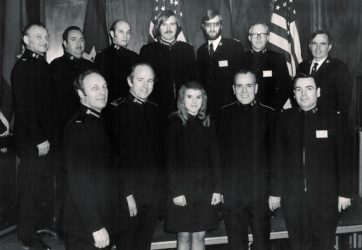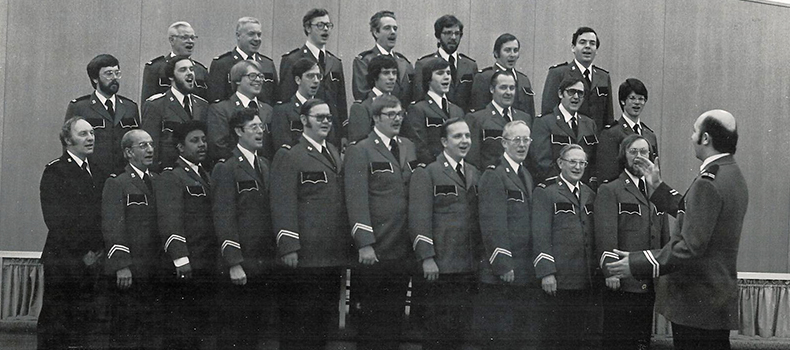October 30, 2017
Assistant Territorial Music Secretary Thomas Scheibner talks to Major Thomas Mack.
 During his tenure as Program Director at Star Lake Musicamp (1975—1981), concurrent with his role as Territorial Music Secretary, Thomas Mack led Star Lake in a period of dynamic resurgence in numbers of campers, quality instructional staff and in the level of musical achievement across the curriculum. During these exciting seven summers he brought outstanding guest musicians to the camp. These included such luminaries as James Curnow, Leslie Condon, Ray Bowes, Per Ohlsson, Norman Bearcroft, Commissioner Richard Holz, Vernon Post, James Williams, and Keitha Needham. At that same time, he guided the growth and development of the revitalized Divisional Music Director program within the territory. These DMDs served as principal members of the instructional staff. Mack’s quiet, humble, yet efficient administration of the camp brought out the very best from those gathered on the Hilltop during this era.
During his tenure as Program Director at Star Lake Musicamp (1975—1981), concurrent with his role as Territorial Music Secretary, Thomas Mack led Star Lake in a period of dynamic resurgence in numbers of campers, quality instructional staff and in the level of musical achievement across the curriculum. During these exciting seven summers he brought outstanding guest musicians to the camp. These included such luminaries as James Curnow, Leslie Condon, Ray Bowes, Per Ohlsson, Norman Bearcroft, Commissioner Richard Holz, Vernon Post, James Williams, and Keitha Needham. At that same time, he guided the growth and development of the revitalized Divisional Music Director program within the territory. These DMDs served as principal members of the instructional staff. Mack’s quiet, humble, yet efficient administration of the camp brought out the very best from those gathered on the Hilltop during this era.
“Tom” Mack first came to SLC as a camper in the late 1950s. He then returned as a staff member starting in 1971. Joining the New York Staff Band in February 1970, he served an extended period of time as the band’s accomplished euphonium soloist, bringing those skills to Star Lake in the euphonium—baritone studio of the Star Lake Band while also teaching classes in music theory, choral program, and even leading the Instructors’ Ensemble. His regular work at the Eastern Territorial Headquarters began in in the Finance Department (1970-74), then his acclaimed period leading the Music Department (1975-81), and finally Legal Department, which he took over in 1985, holding that position until his retirement just a few years ago. In the midst of daunting regular work and heavy music loads in the NYSB (chorus director, band board member, and a variety of other tasks), Mack and his wife, Pat, have continued to serve faithfully at their local corps, Hempstead, Long Island, where he still serves as choir director. They are model Salvationists on multiple levels.

Concurrent with all this, Mack directed the New York Staff Band Chorus for an impressive, and unprecedented 27+ years. His tenure has been marked by excellent adaptability, both in the kind of repertoire and in style of presentation. Always a ‘practical’ musician, Mack supplied the choir, and as a result groups throughout the SA musical world, with a significant, wide range of pieces in both contemporary and traditional styles. The same can be said for his brass band arrangements published by the SA—pieces with a strong mission and ministry focus. He shaped both his choral and brass arrangements so that the ‘average’ corps group could achieve success with diligent preparation. In retirement he continues to write effective music for SA forces, including a long-standing series of Christmas songs, supplying one each year with the Mack Christmas card. Thomas Mack never put himself forward while leading SLC nor in his contributions to the NYSB. He serves as a model for all Star Lakers and his wonderful, understated wit and subtle humor must also be highlighted in this short salute—a true Star Laker and a gentleman!
How did you find out that you were being considered for the appointment as the USA Eastern Territorial Music Secretary in 1974?
After two appointments as assistant corps officer, service on the staff of the School For Officer Training as a field training officer, and three corps officer roles, I was appointed to Territorial Headquarters in February 1970 to the Finance Department, and to play in the New York Staff Band. About four years into that appointment which I enjoyed, I casually mentioned to one of the administrative officers that if The Salvation Army needed help in the Music Department at any time I would be available. The next thing I know, after a few months, I was appointed Territorial Music Director. “Be careful what you ask for.”
What were the initiatives/new programs or publications that were developed during your time as TMS that gave you the most satisfaction?
I was very pleased that every division hired a divisional music director during my time in the Territorial Music Department. We continued the American Band Journal on a regular basis during my seven years. . The Brass Sextet Journal begin during this time. One of the most successful and satisfying publications was “Brass Music For Young Bands.” I remember George Larsson in the trade department telling me he had to reprint the music several times because of its popularity around the world. I do need to give high credit to the various staff members in the office for giving ideas and support to all these projects. The first issue of the Brass Sextet Journal was completely hand written by Doug Burr to reduce the cost, not knowing how popular the publication would be.
You worked with some “high powered” and talented Divisional Music Directors and Music Department staff during your time as TMS, some of whom went on to positions including Territorial Music Secretaries and other prominent professional positions. These included Terry Camsey, Ivor Bosanko, Charles Baker, Ronald Holz, Ron Waiksnoris and Stephen Bulla. What were the challenges and rewards of working with such talented and independent minded individuals?
“High Powered” is putting it mildly! These men and women were deeply and emotionally dedicated to The Salvation Army music ministry. They had strong convictions as to carrying out all aspects of music education and performance. Their backgrounds strongly effected their viewpoints. I believe they all had hearts for what would be the best. Star Lake Music Camp in 1979 comes to mind. At our Territorial Music Director’s Conference in 1978, it was agreed with much reluctance and heated discussion to change the format for Star Lake Musicamp 1979. We agreed, rather than having the usual four level bands and choruses, to make up equal bands and choruses. What a challenge! I lost a little sleep over serving as the mediator between staff disagreements and explosions. I think the most upsetting issue was the response from the campers who had come to Star Lake Musicamp before not knowing if they had progressed since the previous year. More could be said, but we all seemed to survive the ten days. It was generally felt that we should return to the traditional structure.
You were approached at Star Lake Musicamp 1979 by the then Major Norman Bearcroft about considering undertaking a changed of appointment at that time. Can you elaborate on those circumstances and recollections?
After Star Lake Musicamp 1979, I entertained Major Bearcroft at our home on Long Island, NY for a few days. One evening Norman asked to speak to me. I wondered what had happened or what I had done. He said that he was looking for a National Bandmaster to serve in the U.K. and wanted me to consider the position. He explained what my duties would be related to visiting corps bands, conducting rehearsals, taking inventories of personnel and instruments and specialzing as guest conductor and clinician. What an exciting opportunity! He asked me to think it over and talk to my wife, Pat. After an initial heart thumping reaction, I prayed about it and talked to Pat. It didn’t take much thought to turn down the offer. I was settled in my current appointment and home corps and my daughter was starting school. Taking these factors and others into account I told Norman that I appreciated the offer, but that I felt it best for me and my family to remain in the USA.
You and Patricia have been exemplary soldiers and local officers at Hempstead Citadel from 1970 until the present day. Can you tell us what has motivated you to remain there as soldiers of that corps for all of those years – even during a time when a change in quarters made the trip to the corps take over an hour?
When you become a part of a family that you love, you don’t want to leave it. As we arrived at Hempstead Citadel in 1970 we were welcomed with open arms and felt a part of the fellowship almost immediately. Because of my long term appointments at Territorial Headquarters, our daughter was born in Hempstead, attended school and completed college all from the same house and corps, not the usual story of officer children. She also was married at the corps with the New York Staff Band giving musical support. When Territorial Headquarters moved to West Nyack, NY., we did ask administration to allow us to remain on Long Island until our daughter graduated from college which they agreed. It was also at that time that Hempstead Citadel faced several challenges. With the move of Territorial Headquarters and the closing of Booth Memorial Medical Center, the corps lost 65 soldiers. We didn’t want to abandon our church family, so we continued soldiership there even with the long trip to and from the corps each Sunday and Thursday. Now in retirement since 2009 living in Hewlett, NY., we remain active at the corps and are near our daughter, son-in-law and grand daughter, available as needed.
What would be current and future initiatives that you would like to see the present Territorial Music Department undertake in 2017 and beyond?
In 1998 I took a program at Nyack College, NY for the Bachelor of Science Degree in Organizational Management. As part of that program I was required to write a Research Project Report. I chose as my subject, with Salvation Army administration approval, The Future Of The Brass Band Ministry In The Salvation Army Eastern Territory, USA.” What I found through literature, statistics and a questionnaire sent out to a random sample of corps officers, and stated in the Abstract of the research, is that the three areas of focus could be applied to every expression of Christian music, not just bands 1. Salvation Army administration should continue to support Army music financially and with a positive attitude reinforcement. 2. The Salvation Army should continue to develop music leaders. 3. The Salvation Army should continue to support creative programming that will attract not only new musicians but new supporters of the Army and new converts to Christ. I think I would initially concentrate on number 2 – develop music leaders by using existing programs of divisional music camps, Star Lake Musicamp, divisional music conservatories and the position of the divisional music director, as well as revisiting the Erik Leidzen Band Leader Course concept.

